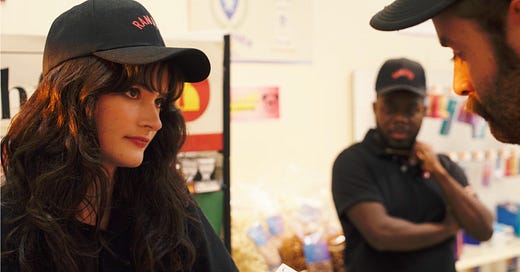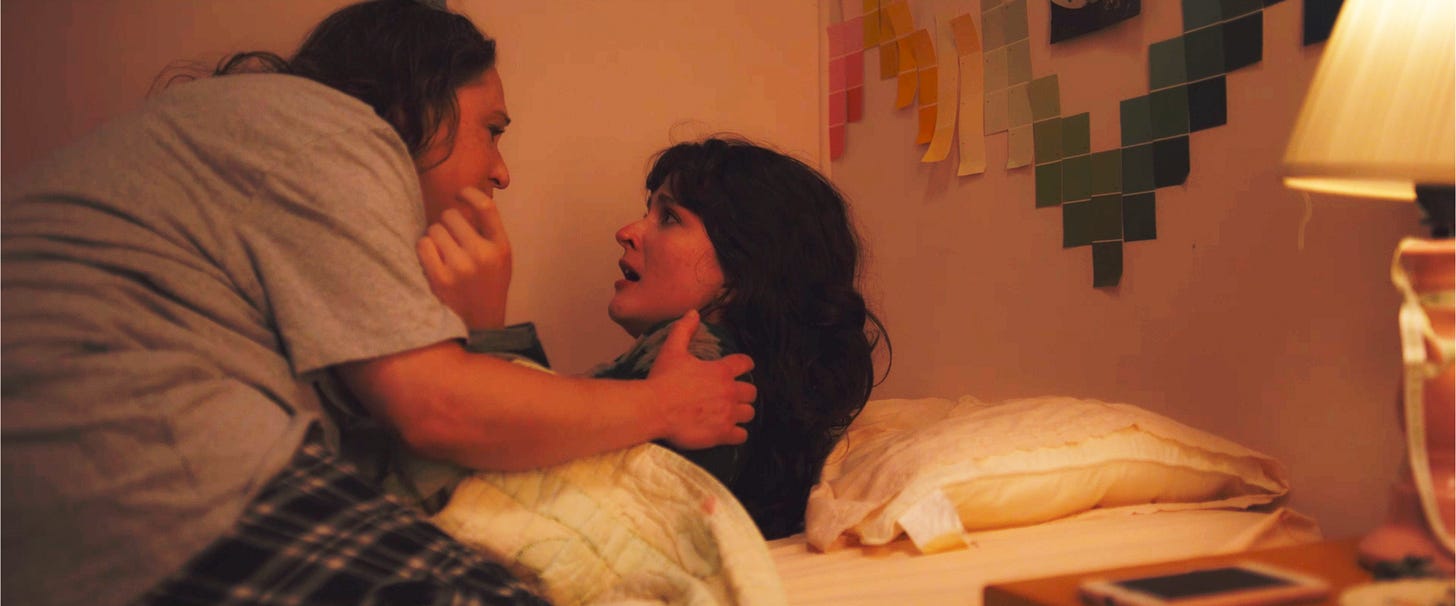No Choice Review: A Nightmare on Roe Street
Hybrid horror-drama about abortion restriction works best when it's out of the dreams, and into the pickup truck
No Choice was presented to me as a “nightmarish thriller” and “genre bender” in a press release that led me to believe it it would be more of a horror movie than it actually is. Most of the time, it really isn't, and the times that it is, it probably shouldn't be. When it sticks to being a drama about disadvantaged people in increasingly difficult situations, it's a compelling, spiraling series of dramatic obstacles that a cast of mostly unknowns gamely and charismatically handles. When it tries to get weird, surreal, and Scary with a capital “s,” that doesn't work quite so well in combination with the social realism.
Presumably inspired at least a little by Kevin Smith, first-time writer-director Nate Hilgartner shot much of the movie in an out-of-business grocery store, depicted here as a convenience store where our main character, Amy (Hannah Deale) works as, yes, a clerk. Hilgartner, however, has more on his mind than workplace humor and sex jokes. Intercourse has major consequences in this story, as Amy finds out when she decide to get intimate with a flirtatious customer named Seth (Hayden Frank)...and the condom breaks.
It's not like she needs any extra hassle. Amy already pays all the bills for herself and her Oxycontin-addicted mother (Jennifer Herzog), and works two jobs as best she can – at the convenience store, and as a house cleaner to a rich client who couldn't care less about her problems. Shifts are subject to change without notice, but Amy rolls with the punches, and is on the verge of saving up enough to take some college courses.
Potential pregnancy throws her for a loop, as whatever state she happens to be in (the movie's filmed in Ithaca, New York, but evidently isn't set there) is solidly anti-abortion, and even something as simple as arranging a ride to a drugstore to buy the morning-after pill is frustrated by inflexible work hours, unavailable friends, and Amy's dependence upon very limited cash, since she has never qualified for a credit card.
The nightmare scenario feels all too real, but Hilgartner isn't content with that, and adds actual nightmares, including an ill-judged opening sequence in which the low-budget visual enhancements just look cheap and off-putting. Later nightmares, shot in dark interiors and featuring blood and scary yelling, are more effective, but not by a whole lot. This isn't Lynchian blurring of reality with dreamscapes – Hilgartner goes out of his way to show Amy waking up almost every time. And the dreams announce themselves stylistically, such that we know there isn't any real danger to them, because there's no reality. In the waking world, we learn that Amy's mother had extremely risky pregnancies that threatened her life; dreams that hammer this point home in a surreal way aren't any scarier than the actual threat of medical trauma.
Eventually, there are some minor payoffs from the dreams. An object from one recurs in real life, and later on, Amy's overreaction to a dream causes her to make a quick mistake that threatens to ruin everything. This would all be more effective if the lines between dreams and reality blurred more, but they are so distinctive that for the most part, a viewer drawn into the main plot might just see the dream sequences as distracting interruptions. I won't spoil the ending, but it's a mildly infuriating, obvious punchline that makes a point we got much sooner, and indeed, begs for a continuation.
It's a testament to the good parts of the movie that I could watch more of them. Deale has star quality: she's pretty and vulnerable, and strikes the right balance for Amy of trying to be hard when she has to be, but knowing her place in the social order and when she can't be. Frank is the right mix of sympathetic and not – it would be easier to make Seth into a findem, fuckem and flee type guy, but he's not unsympathetic to the position he has put Amy in, even as he is decidedly unempathetic to her immediate needs, delaying her abortion trip so he can work on a friend's truck. Robert Denzel Edwards as Amy's coworker Lucas is a similar mix – he's a nice guy, but can't always be counted on. Hilgartner's script gives them all fully dimensional characters to play, and everyone rises to it: Maria Prudente feels absolutely real as a sympathetic – but not overly so – doctor who's limited by the options she can offer. It doesn't enhance the drama to have the cast then mug excessively in the nightmare horror sequences, which perhaps belong in a different, more overtly bloodthirsty thriller.
No Choice is being marketed as a politically important movie, perhaps in the hope that it'll reach people who don't know just how bad abortion bans are, but the self-importance it takes on at the very end feels like it does the characters and story up until then a disservice. I like them, I want to see more of them, and if the only point is that they're ultimately being used as props in a pro-choice argument, well, maybe that's fair game given the way the right uses children as props in the pro-life argument. I don't think No Choice is operating on quite that level of commentary, but even if I'm not fully on board with all of Hilgartner's choices – and it is his first feature, after all – I am totally with his casting, nuances, and ability to generate empathy when he's not busy being overtly stylistic.
No Choice premiered June 23rd at L.A.'s Dances With Films festival. Check the official site and social channels for future screenings.
Images via Hilgartner Productions.
Prefer not to subscribe via Substack? You can leave a tip through Buy Me a Coffee instead.







